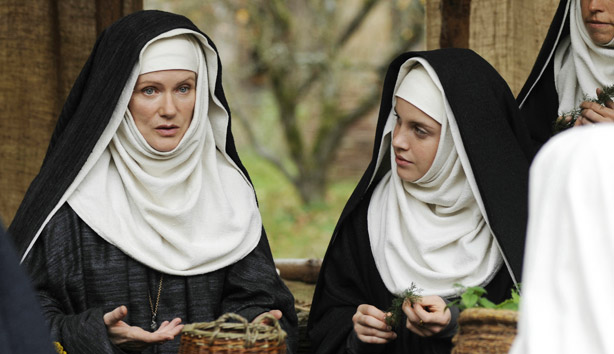Web Feature Posted December 1, 2010
Why We Need Hildegard von Bingen Now
A Film About a 12th-Century Nun Is Timely, If Insufficient
Interview by Jeffrey Overstreet (jeffreyo@spu.edu) | Photos courtesy of Zeitgeist Films

Marilynne Robinson, the celebrated author of Gilead and Housekeeping, recently surprised her fans with an appearance on Comedy Central’s The Daily Show, where she discussed the premise of her new nonfiction work, Absence of Mind, about the ongoing “culture war” between science and religion.
And she dared to suggest that the two “sides” are not as separate as media hype would have us believe. The mainstream media, she said, overlooks a thriving dialogue among people like herself who have a healthy respect for, and curiosity about, both science and faith.
We need role models like her who challenge us to see beyond oversimplifications, to hear reason beyond the shouting. That’s why it’s a good time for the world to rediscover Hildegard von Bingen.
And here she is. The inspiring 12th-century Benedictine nun is the subject of a new film called Vision: From the Life of Hildegard von Bingen. Directed by the celebrated German filmmaker Margarethe von Trotta, it tells the dramatic story of a leader who lived a life of passions and disciplines that seem almost contradictory to a 21st-century mind.
If you’ve heard of Hildegard, you probably know her for the sacred music she composed. But she was also ahead of her time in her scientific inquiry. Her expertise in herbalism made her an effective healer. She was also a philosopher who wrote plays and poetry, and she helped the Benedictine nuns under her supervision gain more influence and responsibility within the church.
She deserves to be the subject of a great film. Is this that movie?
Almost.
Actress Barbara Sukowa gives Hildegard intriguing complexity, a feisty personality, and an almost irresistible charisma that makes most other big-screen portrayals of religious leaders seem simplistic and judgmental. We rarely see Christians depicted as intellectuals with lively imaginations. The film inspires viewers to admire her courage, convictions and talents, but also to question her judgment at times.
We hear her singing her own compositions with the nuns of her order. We see her fall into trances, revelations that lead her to write prophetic testimonies about God. (In the film’s one big special-effects scene, we see one of her visions represented by a fiery eye in the sky that may unsettle fans of The Lord of the Rings.) When Hildegard is offered an opportunity to meet with some of the world’s foremost scholars, she does a little dance of joy.
It offers a rare depiction of intimate, emotional relationships between women and men in a world where romantic entanglements with men were unlikely; and it admirably avoids disrupting its subject with any unnecessary speculation about what other bonds they might have formed. (Many contemporary filmmakers would have found such speculation irresistible.) Hildegard and her fellow nuns are portrayed as believers of conviction and integrity.
Further, the country and cloisters of Hildegard’s world are portrayed with a pleasant, painterly quality that never becomes distracting.
It would be almost impossible to represent all of Hildegard’s passions fairly. What is unfortunate about Vision is that its director seems more interested in gender issues than matters of faith. Much of the film’s energy comes from Hildegard’s clashes with the church’s established patriarchal order; but these conflicts are oversimplified, so that the disgruntled priests look like snarling Da Vinci Code villains as they dismiss or condemn her.
But that’s the subject that clearly inspires Von Trotta. In the press notes, she begins describing Hildegard by saying, “In the 1970s, women involved in the Women’s Movement were looking for historical role models.” Commenting on her subject’s faith, the director says, “Of course she believed in God, and that God sent these visions to her. Everyone believed in God, the devil, Heaven and Hell. What is interesting to me is how Hildegard von Bingen used her visions.”
Thus, the great filmic biography about this woman who embraced faith, art, and science is yet to arrive. A figure like Hildegard should be celebrated with visual poetry, rapturous music, a haunting sense of spiritual mystery, and questions about the God that who she adored. Perhaps a director like Terrence Malick (The New World) could have made something more memorable than this informative but unremarkable biography. Vision: From the Life of Hildegard von Bingen may prove useful to high school history teachers as a tour of the basic layout of Hildegard’s life, but it’s likely to leave you suspecting that the most intriguing chambers are yet to be explored.
